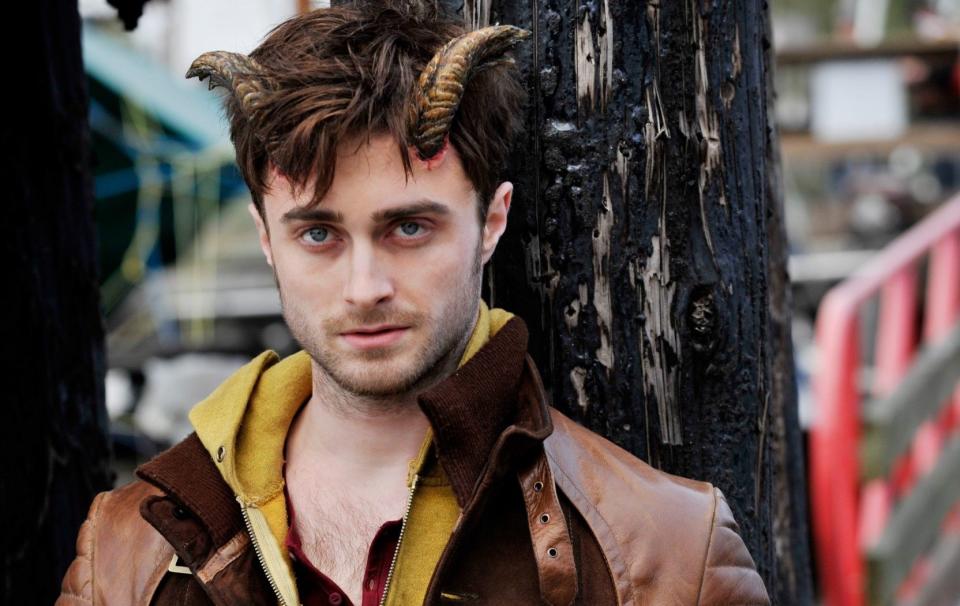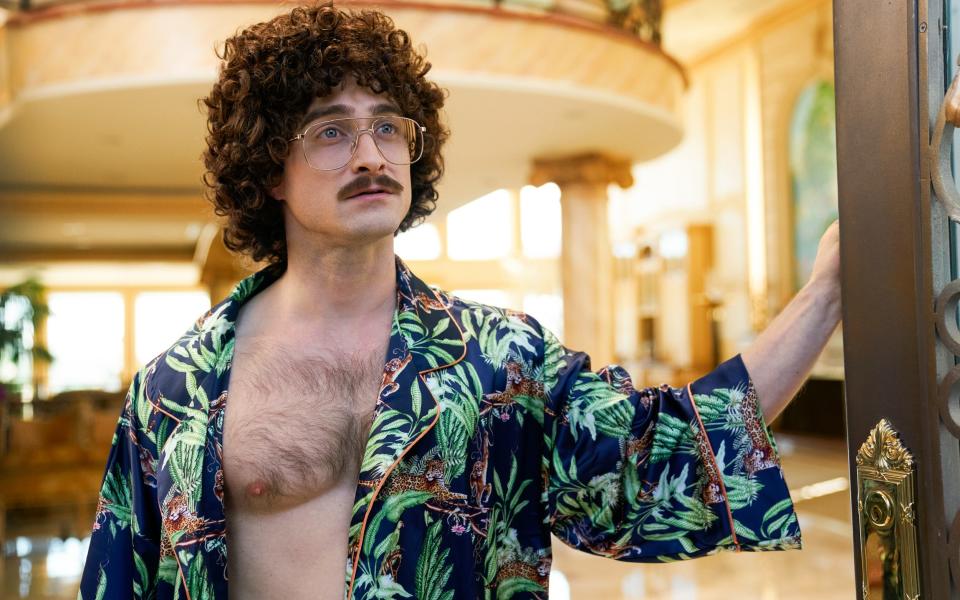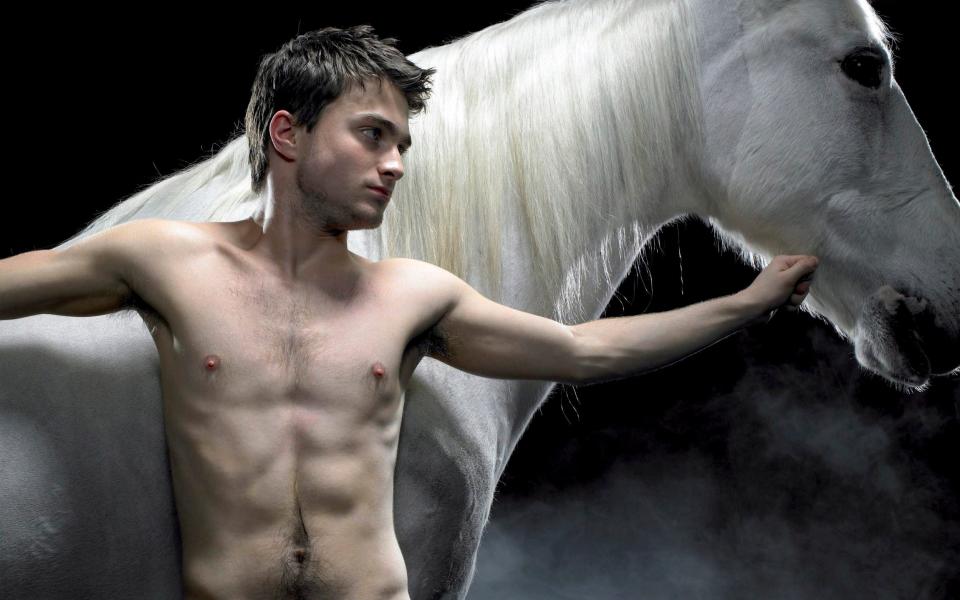Why it’s time for a Daniel Radcliffe renaissance

Hollywood loves a redemption story, and on Sunday night we got two for the price of one. Daniel Radcliffe finally received the critical adulation to match his outsize Potter fame, winning his first Tony Award for his supporting role in the Stephen Sondheim musical Merrily We Roll Along, while this acclaimed Broadway production – which picked up three more Tonys, including Best Revival – belatedly made a hit of Sondheim’s infamous 1981 flop.
While this is undoubtedly a group victory for British actress-turned-director Maria Friedman and her lead cast – Jonathan Groff (also a Tony winner for the show) and Lindsay Mendez – it must be especially heartening for the former Boy Wizard. He hasn’t exactly been drowning in praise for his acting talents – either for the Potter films, in which he mainly gawped at unseen special effects, nor in the years since, despite a fascinatingly eclectic choice of projects.
However, the actor recently scored his first Bafta and Emmy nominations for his portrayal of the musical comedian Weird Al Yankovic, and he has now topped that with his Tony win. Have we misjudged his abilities in the past? Or has The Boy Who Couldn’t Act transformed into a legitimate thespian, resulting in a Radcliffaissance?
It does seem harsh to cast a critical eye over the efforts of a 12-year-old – and yet that’s what we all did when the first Harry Potter film came flying onto cinema screens in 2001. Radcliffe looked the part (although that was mainly down to the scar and the specs), he had a camera-ready smile and a good – if overused – line in wide-eyed wonder, but he wasn’t exactly Daniel Day-Lewis. Even Radcliffe admitted as much when he looked back on his youthful efforts, saying “I don’t think what I was doing in the first two films could really be called acting”.
In his defence, these unwieldy franchises are seldom renowned for their subtle performances. Alan Rickman is a great Snape, but he swoops around the Hogwarts Great Hall like an angry bat, while even the indomitable Maggie Smith begins to check out around the series’ halfway mark. That’s because the director’s energy is largely focussed on the (multimillion-pound) bigger picture: corralling the thousands of child extras, or envisioning the carnage caused by a rampaging troll.
Nevertheless, Radcliffe’s performance does improve over the Potter films, gaining nuance and emotional heft by the fourth film, Goblet of Fire. I particularly love the scene in the penultimate instalment where he and Emma Watson’s Hermione share a brief respite from the gloom by dancing to a song on the radio. It’s loose, spontaneous and affectionate, and Radcliffe – for once – looks wholly confident in his choices. Perhaps it was by osmosis – you’d be hard pressed to share scenes with the likes of Rickman, Smith and Gary Oldman without picking up the odd thing.
We also know now that, at the time, Radcliffe was battling with the pressures of this sudden fame – which in turn fuelled his problems with alcohol. He could well have gone the same way as child stars like Lindsay Lohan, Amanda Bynes or Macaulay Culkin.
Instead, Radcliffe got a handle on his sobriety, and then used his newfound wealth and A-lister status to get some truly bizarre projects greenlit. He was a murder suspect who grew horns in the 2013 movie Horns, the hunchbacked Igor in 2015 misfire Victor Frankenstein, and, notoriously, a farting corpse in 2016 film Swiss Army Man. Radcliffe also had a crack at a romcom (What If), a survival drama (Jungle), and a ridiculous, ultraviolent crime caper (Guns Akimbo).
None of these really made the case for him as an adult star, one who could match his early Potter success – and also outgrow the association. (Something he seems eager to do given his recent conflicts with author JK Rowling over trans issues.)

But I’d argue that’s because Potter placed Radcliffe in the wrong bracket. Beyond Hogwarts, he’s never really seemed like a natural Hollywood leading man – he’s neither a buff Marvel hero nor brimming with firecracker charisma or Timothée Chalamet-esque pouting sexuality. He’s actually a curious, and increasingly interesting, character actor. He’s not afraid to take risks (that wizard financial cushion does help), and he will surely get more of these roles that actually suit him as he gets older.
Radcliffe has already gained a certain level of respect with his somewhat eccentric approach, lending support to experimental filmmakers purely by attaching his box-office-friendly name. He then got some of the best reviews of his career for playing Weird Al Yankovic (famous for his parody songs like My Bologna instead of My Sharona) in the 2022 biopic. The New York Times praised him lip-syncing “with such commitment that his neck veins nearly pop.” The Telegraph’s Tim Robey noted that Radcliffe was “clearly having the time of his life.”

He’s the kind of actor whose effort you notice, and often admire – a quality that endears you to theatre audiences far more than cinema ones.
Radcliffe’s first major post-franchise role was in Peter Shaffer’s play Equus, in the West End and then on Broadway, playing opposite his Potter co-star Richard Griffiths. Although a lot of the conversation was taken up by the fact that the 17-year-old Radcliffe had a nude scene, there was also admiration for his committed performance as a deeply troubled boy. The Telegraph’s Charles Spencer commended the way Radcliffe “keeps turning the emotion on a sixpence, switching from sullen anger to raw vulnerability, or from terrible pain to a sudden childlike innocence and charm.”
Radcliffe took another big risk by starring in the Broadway musical How to Succeed in Business Without Really Trying in 2011, tackling big song-and-dance numbers. Reviewers weren’t entirely convinced (there was more praise for his game efforts, with one calling him an “honest-to-goodness trouper”, than his musical talents), but once again the stage let him experiment and grow. Theatre likes a try-hard.

He’s also returned to the London stage, choosing challenging modern classics like Martin McDonagh’s The Cripple of Inishmaan in 2013, in which Spencer praised Radcliffe’s “touching stoicism and simplicity… all the more moving because it is so understated”. There was also Tom Stoppard’s Rosencrantz and Guildenstern Are Dead in 2017, in which his “school-boyish eagerness” prompted a nod of approval from the Telegraph’s Dominic Cavendish. It was that buoyancy of youth, however, that let him down in Samuel Beckett’s Endgame in 2020, where he played the decrepit Clov.
Nevertheless that gonzo strategy has paid off handsomely with Merrily We Roll Along, the backwards-rolling Sondheim musical about three artistic friends and how their relationships change over the course of 20 years.
Radcliffe plays the idealistic playwright Charley, who grows embittered when his composer partner Frank sells out. All of his resentments come spewing out in the lightning-fast patter song Franklin Shepard, Inc. – which Radcliffe absolutely nails. He probably drew on his lifelong rap fandom; you can watch his pretty excellent version of Alphabet Aerobics on YouTube.
It’s hard to say if this is really a defining moment for Radcliffe as an thespian, or the happy culmination of a role that fits him, and castmates (Groff and Mendez) who have become great friends in real life, giving the whole production a winning authenticity. Radcliffe has also spoken about how becoming a parent has shaped his freshly emotional response to the role, and to poignant lyrics like in the song Our Time: “It’s our time / Breathe it in / Worlds to change, and worlds to win.”
He’s endeared himself enormously to the Broadway community by giving Sondheim’s failed show this dreamlike redemption arc. His Potter fame helped make it a stonking commercial success, and this brilliant company – of which Radcliffe was a vital member – ensured that this complex musical connected with audiences in a way it never has before.
Is it now Radcliffe’s time? I’d say so: the Boy Wizard is finally making acting magic.

 Yahoo News
Yahoo News 
